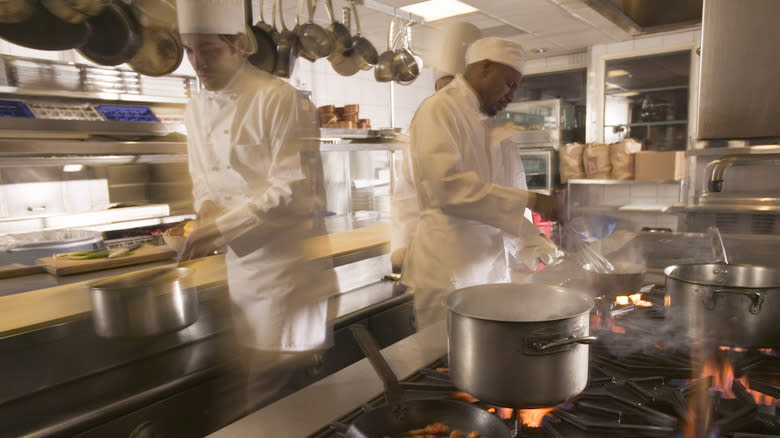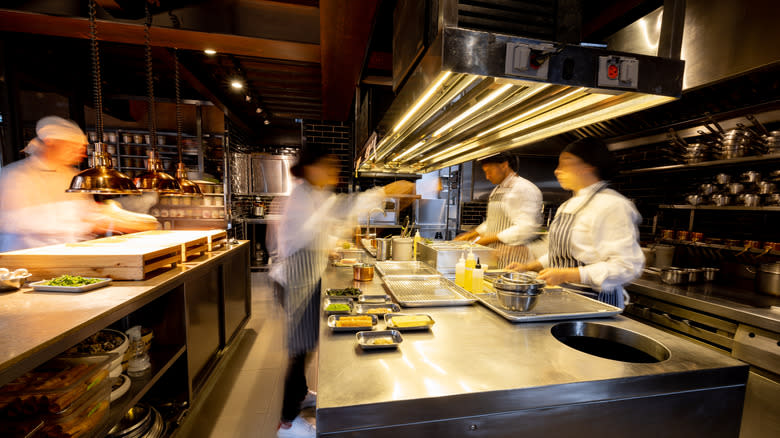Here's Why Stations Are So Important In A Professional Kitchen

Restaurant terminology and operations can often seem, to outsiders, like a confusing miasma of terminology and procedure. What does it mean when something is 86ed? (It's out of stock). Why does everyone shout "corner" all the time? (It's a safety precaution). And what in the heck are "stations?"
Fortunately, that last question is one of the easiest to answer conceptually: Stations are specific areas of operation that one chef (or maybe a few chefs, if you're talking about a very large kitchen) typically staffs to the exclusion of any other duties on that shift. This can include things like a fry station, a saute station, a saucier station, a grill station, or a cold station -- what stations exist depends entirely on the needs of the specific restaurant in question. One thing's universal, though: As soon as you hit a certain size, attempting to operate a kitchen without stations quickly turns into an unmitigated disaster.
So why are stations so important? Two reasons: efficiency and safety, and both matter in equal proportions.
Read more: The Best Kitchen Gadgets You Can Buy
Stations Are Extremely Efficient

Think of a restaurant as an assembly line. Would a person or a robot at a Ford factory run around trying to put together a muffler, then part of an engine, then a windshield wiper? Of course not; they're going to have different individuals doing one job each, because it's far more efficient if someone can focus on one task at a time and just do it over and over again.
It's the same way with restaurants. Chefs are assigned to stations because it has been proven over and over again to be the most efficient way to do the job. If one person is cutting up vegetables, the uncut vegetables are always going to be in one spot (at the vegetable-cutting person) rather than spread out all over the kitchen.
In restaurants over a certain level, the executive chef (the one in charge) will barely cook at all. Their job (or that of their sous chef, if they delegate actual kitchen operations) is simply to oversee all the stations, manage the kitchen, and taste to ensure quality.
Stations Ensure The Kitchen Is Safer For Both Customers And Staff

Stations are also a safeguard against safety concerns -- both for chefs themselves and for the diners eating their food. The latter is pretty self-explanatory; when there's one station where all the raw chicken is being prepped for cooking, you're going to be less likely to see potential contaminants or bacteria from that uncooked chicken winding up in the salad. Put everything right near each other without any separation and you're asking for a food poisoning issue.
Meanwhile, stations ensure things are safer for the chefs themselves. A restaurant kitchen is a place that's at once rigidly orderly and deeply, deeply chaotic; you'll have people doing specific jobs, sure, but they're also doing those jobs very, very quickly with kitchen implements that are very, very dangerous if they're not handled correctly. What do you think happens if the people doing those dangerous jobs with dangerous tools very fast are moving around near each other and getting in each others' way? Trips to the emergency room (or the morgue), that's what -- and nobody wants that.
Put all these factors together and it's easy to see why stations exist: Because there's definitively no upside to operating without them. Restaurants have gotten safer, faster, and better since stations became de rigeur -- and we should all be thankful for it.
Read the original article on Daily Meal.


